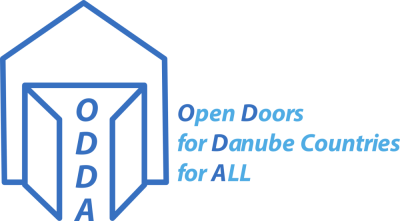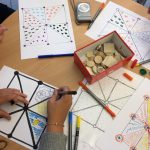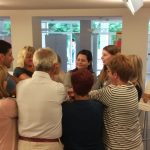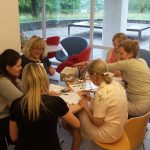In Bad Urach and Ruse we conducted some intercultural workshops to make us more sensitive for intercultural encounters. The intention was to make us aware of the different cultural traditions and dispositions and the risk of wrong interpretations. Care is the precondition for encounters of equals.
Recognizing intercultural competences
Objective: What shows that I am interculturally competent?
The workshop will start with the definition and presentation of intercultural competence. Then the participants will receive the questionnaire in their language and start to complete it. Every question will be accompanied by a photo for a better understanding. After the completion of the questionnaire, there will be a debate about recognizing intercultural competences.
Intercultural Workshop I
Lecturer: Lilijana Cumura
Objective: To gain an intercultural learning experience and understand the basics of culture concept
The main goal of intercultural learning is seen as the development of intercultural competence, which is the ability to act and relate appropriately and effectively in various cultural contexts. We will work on issues how to deal with cultural differences and how to overcome them. Workshop starts with the simulation Card game. After the debriefing of the simulation game participants discuss the following questions: “what is culture”, “multicultural and intercultural society”, “what is importance of language in culture”, “what is the role of traditions and rules in culture”, etc. Workshop will end with the short presentation of the Iceberg model of Culture.
Read a fill report on the experiences and implementation of the workshop by Lilijana Cumura:
ODDA Intercultural Workshop I, report by LJ. Cumura
Interview with Lilijana Cumura
Intercultural Workshop II
Lecturers: Silvija Mrsic, Petra Glogolja Krcmar
Objective: Learn the basic principles of communication with intercultural groups; Understand the immigrants problems who want to integrate into the local community; Understand the importance and role of communication in establishing a first contact; Identify difficulties in the process of communication with immigrants.
Participants will be taking part in different exercises related to development of intercultural sensitivity with special emphasis on immigrants. They will have to fill questionnaire specially made to measure intercultural sensitivity. After completion of exercises we will present our experience with immigrants.
Intercultural Workshop III
Lecturer: Hristina Sokolova
Travelling the Danube: How to Make Intercultural Predictions
Objective: To be able to predict social norms and behaviours in the Danube region based on the information from the intercultural analysis tools. To be prepared what to expect from the host country without knowing its official language and its cultural heritage.
Working with the main intercultural analysis tools on the internet: geert-hofstede.com, culture-crossing.org, etc. Making predictions about the visited country based on the provided data.
Travelling the Danube – by Dr. Hristina Sokolova
Intercultural Workshop IV
Lecturer: Sabine Meiglel, Ieva Ciuta
Nonverbal communication with playful methods
Objective: All children of the world like to play. For this reason the participants should develop easy games that can be easily made from scratch by using simple materials and little money at the “Europafeste” and the “Donaufeste”. All games are characterized by being easy to explain and barerly needing any language. Following questions should be answered: Do the toys on the Danube look the same everywhere? Which games that work without material can we play? How do we design our own toys by using simple resources?
Methods and results:
Workshop Civil Society
Lecturer: Dusana Findeisen
Over decades EU has become a framework for numerous enriching cultural, social, economic and other transactions among member states in accordance with the endeavours of an initially closed circle as well as theories on which European Union was built (theory of integration, functionalist theory, transactional theory, etc.). Europe has failed to impose itself as a political force and has failed in the process of globalisation, but EU is also believed to have a chance, to tackle, democratically, issues of common and global interest, such as environmental issues, reversing the global trend of the market economy (Habermas, 2009, p.105) the demographic changes, the refugee issues.These large issues Europe is dealing with cannot be dealt with in isolation, but on the contrary, should become subject to large-scale public debate and real civil dialogue. (Jacques Delors). If citizens and their civil society organisations were to own Europe, they should be clear about their expectations and their contribution towards Europe while going on developing their European identity. But what is European identity?
Interview with Prof. Dr. Findeisen
In the context of the international seminar “Creating Bridges for Europe” at Haus auf der Alb in Bad Urach, Germany, an international group of the Danube-Networkers visited the company BeckaBeck in Römerstein on the Swabian Jura on 26th July.
For impressions on experiences of the workshops, look at our Photo and Video section



